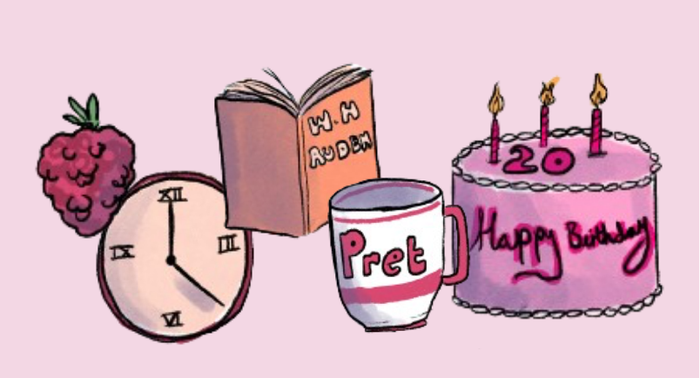Learning to love learning again
A beginner’s guide to auditing (and unlocking your inner academic)

If the English education system is good at anything, it’s sucking the joy out of learning. A-levels are a game of memorising mark schemes (AQA Biology, I’m looking at you), finding loopholes, and churning out essays according to prescriptive acronyms for paragraph structure. So arriving at Cambridge as a wide-eyed humanities fresher was jarring. Suddenly there was no algorithm for exams to learn. It quickly dawned on me that I didn’t know how to do education without rote learning.
Cut to a conversation with my college dad in freshers’ week, where I bemoaned the lack of fun modules in my first-year course. He suggested auditing. ‘Auditing’ is the fancy Cambridge term for going to lectures in papers you’re not taking – apparently, it was a lot more common before the pandemic and has never really bounced back.
“Auditing is the fancy Cambridge term for going to lectures in papers you’re not taking”
So that’s what I did. Using my superpower of having way too few lectures for my liking, I got to go to all the fun modules my course didn’t offer. In first year, this was B1: Intro to Biological Anthropology, where I got to hold a skull cast of early human ‘Lucy’ (much to the excitement of my inner evolutionary biology nerd); in second year, this was POL21: The Politics of Dystopian Fiction, where I was lectured on the history of utopian and dystopian thought (spoiler alert: it’s nearly all eugenics); finally, this year was SOC13: The Sociology of Health, Medicine and Society. This was only an extra hour or so of lectures each week, but they were always my favourite. Without sounding like a complete neek, there was something so refreshing about listening to a lecture purely because it was really interesting, rather than because I’d be tested on it come Easter term.
“Using my superpower of having way too few lectures for my liking, I got to go to all the fun modules my course didn’t offer”
Coming to the end of my time at Cambridge, I’m finding myself reflecting more and more on what I’ve learned here, beyond course content. Auditing taught me a lot – more than just the shape of homonim skulls. First of all: learning is fun (especially when you don’t have to worry about revision-worthy notes). I think it’s easy to forget that we actually enjoy learning new things among the whirlwind of weekly essays. Having time to just listen felt far removed from the frantic clacking of keyboards which usually characterises lectures. Second, we are paying a hell of a lot to this university – get your money’s worth! As a humanities student, I feel like I’m being ripped off with my contact hours. Eight hours a week (including supos) doesn’t really feel worth it for the £9,000 a year. Bleed ’em dry. Finally – and most unexpectedly for me – what you learn may actually end up helping your real degree. Over the three years, I realised that learning from a different discipline (or even just a different paper) helped me think laterally about familiar topics from my core papers.
“Auditing taught me a lot – more than just the shape of homonim skulls”
So, what now? If you’re persuaded to audit some lectures yourself, you might have to wait until Michaelmas for modules to start again properly. However, from there, it’s a matter of going to the Cambridge Timetable website, adding your desired module’s lecture schedule to your calendar, and then simply showing up. Maybe if you’re really keen you can email the paper coordinator to be added to the Moodle page, but that’s just an extra.
I’d like to be clear, having an empty enough timetable to opt in to lectures is not a universal Cambridge experience. But there’s gotta be some perks of being ripped off as a humanities student, right? And, to give a very humanities-student commentary, I’m at uni to learn, not just to pass an exam.
But now it’s Easter term, and I’m staring down the barrel of the gun (impending finals) and wondering why I spent so long pissing about, attending lectures that didn’t matter. Except they did. They taught me to think critically about my own subject, to realise that university isn’t just about chasing that grade, and most importantly – to love learning again.
 Features / The etiquette of inequality at Cambridge: making tradition inclusive24 January 2025
Features / The etiquette of inequality at Cambridge: making tradition inclusive24 January 2025 News / University creates ‘AI’ category for academic misconduct after rise in cases24 January 2025
News / University creates ‘AI’ category for academic misconduct after rise in cases24 January 2025 News / Ex-PVC splashed over £5k on expenses24 January 2025
News / Ex-PVC splashed over £5k on expenses24 January 2025 News / Cambridge PhD student accuses Pakistan intelligence of ‘state-sponsored threats’24 January 2025
News / Cambridge PhD student accuses Pakistan intelligence of ‘state-sponsored threats’24 January 2025 Lifestyle / Notebook: The collections of a Cambridge student24 January 2025
Lifestyle / Notebook: The collections of a Cambridge student24 January 2025






